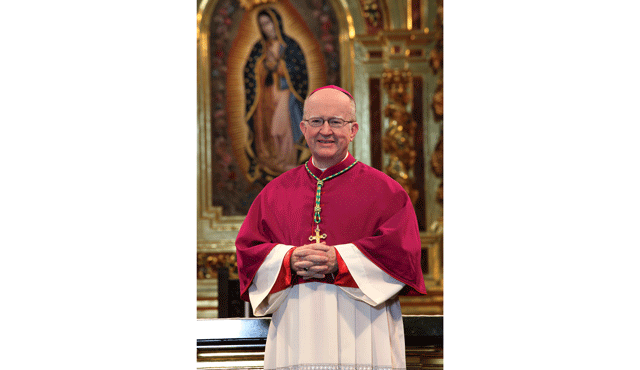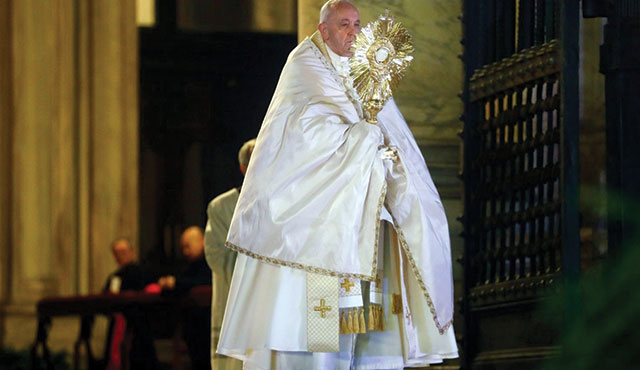This reflection, which follows my writing on my Confirmation sponsor Jim Whitaker, is a blending together of our late January/early February visit to the Holy See with Pope Francis and the offices of the Roman Curia just as the first signs of the Coronavirus began to emerge in Italy. It all came together for me as I was walking the streets of Rome, which I know so well from my years of study there, as I saw the memorials to St. Frances of Rome (near the Colosseum), and St. Aloysius Gonzaga, both of whom were involved in ministry to plague victims of earlier ages. St. Aloysius, as a Jesuit novice, died as he was helping to take care of victims of an earlier period of plague, most likely the “Bubonic plague.” I would look up at the Castel San Angelo and see the image of St. Michael from the time when yet another plague was ending. In those days during our “Ad Limina” visit I happened to see once again the history of plagues in Italy, how they were met with faith and how they alerted history. This had all been history to me, and in fact many of us. That is, however, until the news of Kobe Bryant’s death gave way to the news from Wuhan, China, and even in Rome I began to see folks walking the streets of Rome with their face masks.
Providentially, I decided not to remain any longer in Rome and Italy (I was supposed to be there for a “Focolare” meeting, but decided I had better return home. This turned out to be for me a “providential decision.” I am certainly grateful that I learned about “Divine Providence” from the Vincentians and Daughters of Charity when I was a seminarian at Kenrick Seminary years ago in St. Louis.
All of this came back to me again yesterday as I joined with the Holy Father in prayer in St. Peter’s Square as he prayed for all of us, venerated the icon of “Salus Populi Romani” [an icon of the Blessed Mother which is in St. Mary Major and which was carried through the streets of Rome during plagues of earlier times.] He asked that another image, that of a large crucifix, be brought from the Church of San Marcello in Rome [on the Via del Corso – a normally busy shopping street] and which also had been carried through the streets of Rome during another time of plague. It was a miserable rainy evening, only brightened by the light in St. Peter’s Square, and the blue lights of the police (carabinieri) which surrounded St. Peter’s square on that rainy evening.
I have been blessed to be present in St. Peter’s Square for some great and festive occasions, but nothing was more intimate than the time with Pope Francis this past week.
As I was speaking to some of our priests in these days, as challenging as this is in so many ways [personally for me, as my brother Les is having some major health challenges at the moment and I cannot be there with him], this is a time, also in God’s providence, where we have to take the theology that we once learned and see it not as something on a textbook page, but “incarnate” in real life. This reminds me of what I heard attributed to Fr. Karl Rahner SJ, something like: “theology is best when it is from one’s knees.”
Because I am in one of the groups who are considered “at risk,” (which for me is age and being diabetic), I am praying for all of you and reaching out to as many as possible. Not being able to go out to be present in ministry and mission is a far greater penance that any feeble attempt in the past to “give up something” during Lent.
I will close with the prayer of Pope Francis from St. Peter’s Square the other day:
“Dear brothers and sisters, from this place that tells of Peter’s rock-solid faith, I would like this evening to entrust all of you to the Lord, through the intercession of Mary, Health of the People and Star of the stormy Sea. From this colonnade that embraces Rome and the whole world, may God’s blessing come down upon you as a consoling embrace. Lord, may you bless the world, give health to our bodies and comfort our hearts. You ask us not to be afraid. Yet our faith is weak and we are fearful. But you, Lord, will not leave us at the mercy of the storm. Tell us again: ‘Do not be afraid’ (Mt 28:5). And we, together with Peter, ‘cast all our anxieties onto you, for you care about us’ (cf. 1Pet 5:7).”


